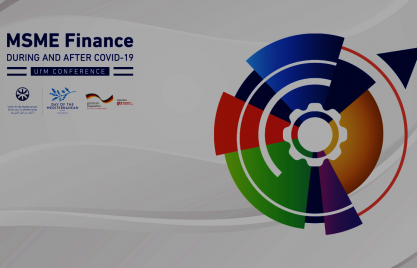A new generation of financial technology (Fintech) startups, championing financial institutions, and technology providers has in recent years been shaking up financial markets worldwide by leveraging computational powers for innovations in finance. In the Arab region as well, this calls for approaches to harnessing fintech disruption with benefits for the society and economy while protecting citizens and the financial system from destructive technology.
Finance has been evolving through technological inventions for centuries. Yet, over the last decade technology-driven innovations in finance have bolstered citizens’ access to a multiplicity of services in payments, lending, insurance, saving, and investment at their fingertips at unprecedented pace and scale.
Fintech holds promise to enhance the financial inclusion of millions of individuals and MSMEs in Arab countries by overcoming traditional barriers. The market in the region is expected to be worth a whopping USD 2.5 billion by 2022. Equipped with new tools, such as supervisory technology (SupTech), regulators can rise with the occasion to better address emergent risks and balance the promotion of Fintech with inclusion, stability, integrity, and customer protection.
Blockchain technology is one of the most notable archetypal fintech novelties besides artificial intelligence, cloud services, and big data. The decentralized ledger technology can be used in view of greater market efficiency and inclusiveness: for example, in clearing and settlement, cross-border money transfers, retail payments, digital currencies, and digital identity.
The ICT and financial sectors, both at the nexus of fintech, are considered as growth markets and enablers for the Arab economies. An increasingly well-educated, tech-savvy, yet underemployed youth is prone to adopting innovative services or to starting ventures for such. Incentivized by the improvements in infrastructure and the vast market potential of unbanked people in the Arab region (63% of adults, World Bank) and businesses (USD 2.5 bn funding gap, IFC), disruptive start-ups, technology companies (Big Techs) with deep pockets and data pools, financial institutions, and authorities push for innovations in finance.
The challenges to the adoption of fintech are multifold. Legacy regulations are the number one obstacle to the growth of fintech start-ups, fueling regulatory arbitrage: a 2017 study finds that more than 85% of surveyed fintechs are ready to leave to other countries for regulatory reasons. As technology does not know borders and requires scale to be profitable, multinational firms have an advantage over home-grown start-ups that find it difficult to expand into new markets across borders. Above all, the brave new world inherits not only opportunities but also known and unknown risks at the level of individuals (e.g., fraud, data security, infringement of data privacy, discrimination, etc.) and the financial system (e.g., instability, contagion, exclusion, cyber incidents, etc.).
Central Banks and other monetary authorities play a pioneering role in actively testing solutions for greater public benefit. For example, the Monetary Authority of Singapore has recently concluded a trial run of conducting interbank payments and securities settlements on a blockchain, and the Bank of Canada has run a project targeting cash transfers between banks. Such applications draw attention for the potential in the Arab world.
Last December’s Arab #FinTex Symposium, held under the Financial Inclusion for the Arab Region Initiative (FIARI), provided the space for regulators, professionals, and academic experts to examine the potential of fintech in the region. Countries have already brought to light impressive projects, such as: Peaqock Financials (Morocco; reporting and analytics platform provider), AtCash (UAE; DLT-based digital identity solutions), and Neumann (Lebanon; AI data platform provider), and the sovereign Smart Dubai initiative.
There is considerable room for the creation of an enabling ecosystem for even more transformative fintechs to see the light of day. The top listed Arab country in the Global Innovation Index is the UAE ranked 38th, followed by Qatar and Saudi Arabia ranked 51st and 61st, respectively.
For a common ecosystem conducive for financial innovation in the Arab region, there is a need for action in three areas:
- Regulatory cooperation: There is room to create a safe environment for regulatory authorities to share experience with technology solutions, exchange supervisory information, and collaborate on emerging fintech issues and smart regulation.
- Regulatory learning: Financial authorities can build institutional capacities by pro-actively exposing technical experts and decision-makers to joint trainings, peer-learning, and international good practice in country approaches to new technologies.
- Regulatory experimentation: authorities may choose, bilaterally or multilaterally, to implement joint tests for adequate RegTech for regulators and even to harmonize approaches to licensing of Fintech firms (passporting). An environment of dialogue, hackathons, bootcamps could reduce time-to-market of innovative solutions by Fintech firms, allowing them to scale or trial solutions across borders on a level playing field and more efficiently.
A new framework for collaboration of financial regulators on innovation-related topics can help to build institutional capacities and strengthen regionally integrated framework conditions for the cross-border expansion of technology in finance relevant for inclusion, stability, integrity, and protection considerations.
International initiatives for new cooperation frameworks have already emerged on a supra-regional scale to test, pilot, or promote Blockchain and Fintech solutions, such as the ASEAN Financial Innovation Network (AFIN) and the Global Financial Innovation Network (GFIN). AFIN already operates the API market and sandbox platform APIX; while GFIN is yet at its infant stage, plans are to offer both a co-sandboxing approach for testing new services in multiple jurisdictions as well as providing a cross-border forum for knowledge exchange.
As startups and incumbents alike rush to the market with new technology solutions, a supportive ecosystem in the Arab region based on cooperation, learning and experimentation is inevitable to make financial sectors robust and friendly to innovation, to allow customers to thrive and markets to flourish, and to guide countries on their path to digital economies. By joining forces, financial policymakers, advocates, and change agents can unlock this vast potential for the benefit of sustainable economic development in the region.
By Atilla Kaiser-Yücel, GIZ and Armin Satzger
Access this post in Arabic: ابتكارات التكنولوجيا المالية والشمول المالي
This blog post is part of the “Fintech and Blockchain for Financial Inclusion in the Arab World Blog Series,” published on the Arabic FinDev Gateway and GIZ’s fimena.org. It explores some of the key issues that were discussed at the 2018 Arab #FinTex Symposium held in Abu Dhabi, UAE, from December 12-13, 2018 under the Financial Inclusion for the Arab Region Initiative (FIARI) by AMF, GIZ on behalf of BMZ, AFI, and World Bank, co-hosted by the UAE Central Bank.



